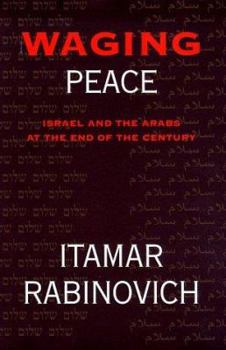Waging Peace: Israel and the Arabs at the End of the Century
No Synopsis Available.
Format:Hardcover
Language:English
ISBN:0374105766
ISBN13:9780374105761
Release Date:January 1999
Publisher:Farrar Straus Giroux
Length:227 Pages
Weight:0.91 lbs.
Dimensions:1.0" x 5.9" x 8.6"
Customer Reviews
1 rating
A history of the peace process
Published by Thriftbooks.com User , 23 years ago
In his book Waging Peace, Itamar Rabinovich provides an overview of Israel's relationship with the Arab world. He offers his readers a detailed look at the history of the Arab-Israeli conflict and suggests ways in which the competing parties can reach a normalization of their relations. He begins his book by outlining the major areas of conflict and examining the history of these conflicts since Israel's declaration of independence in May 1948. These major areas include the conflict between the Palestinians and Israelis, the conflict between Israel and Arab nationalism, Israel's disputes with its neighboring Arab states, and the broader international conflict. He also traces the history of the peace process from its unproductive beginnings to its most significant phases in the early 1990s. A significant part of Rabinovich's book discusses the "Madrid process" which began in 1991 with the Madrid conference. He discusses the successes and failures of this process detailing Israel's agreement with the PLO and its failure to make any significant progress with Syria. Next Rabinovich looks at the near collapse of the peace process with the election in 1996 of Netanyahu who vowed to set a much more deliberate pace in the peace process than either Peres or Rabin and avoid sweeping changes and broad agreements without definite and viable security concessions from the PLO and the neighboring Arab states. Rabinovich then details the revival of the peace process under Netanyahu with the Wye River Agreement and provides an overview of Israel's current relationship with the PLO, its neighbors, and other Middle Eastern states like Saudi Arabia and Iraq. Rabinovich's final assessment is made as the Israeli elections of 1999 approach. He makes it clear that the outcome of these elections will significantly influence the direction and intensity of the peace process. He concludes with his ideas about the conditions necessary for a successful normalization of relations between the Arabs and Jews. Believing that the Oslo agreements have "created a new reality (212)," Rabinovich indicates that any future agreement will have to be a comprehensive settlement broken down into various phases with leaders on all sides willing to promote peace in the face of crises and criticism. Neither side can expect a quick fix but rather a lengthy struggle. Rabinovich sees this struggle as necessary and inevitable. Although focusing primarily on the Israeli side, Rabinovich provides a thorough overview of the conflict between the Arabs and Israelis and the history of the peace process through 1999. His examination helps clarify the multitude of interrelated issues and disputes that make up the Arab-Israeli conflict. Throughout the book, Rabinovich offers his assessment of the various phases of the peace process. His most extensive analysis is of the phases following the Madrid Conference of 1991. His background as Israeli ambassador to the U.S. (1993-96) and head of t






